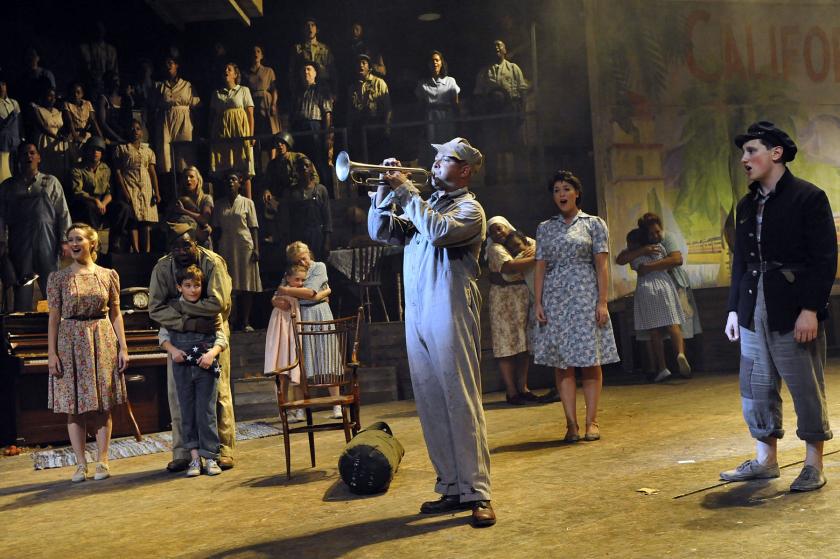It takes a brave company to revive a notorious Broadway flop. It takes an even braver one to supplement a small cast with an amateur, community chorus of over 60 people, onstage for almost the entire duration. The Young Vic can rarely be accused of lacking ambition, and their latest production – sprawling American musical The Human Comedy by Hair’s Galt MacDermot – is as ambitious as it gets. Reinventing a flawed fantasy-parable about community as genuine community theatre, they have tapped into a sincerity that no amount of slick Broadway effects could hope to match – a sincerity that, if it cannot quite redeem the play’s faults, sure as hell comes close.
Set during the Second World War in Ithaca, “a little town in California, not famous for anything”, The Human Comedy adapts William Saroyan’s somewhat Pollyanna-ish tale of Homer MacCauley, a 14-year-old boy on the cusp of manhood. Together with his mother, sister Bess and younger brother Ulysses, he awaits the return of older brother Marcus from the war. In an attempt to fill his dead father’s shoes, Homer takes a job in the local telegraph office, and finds himself responsible not only for delivering messages of celebration, but also the dreaded telegrams from the War Department.
You can see where the story is headed a mile off, but the looming threat of the clicking telegraph keys that upsets the homespun rhythms of Ithaca’s life adds a much-needed tension to what would otherwise be an unbearable Goody Two-Shoes of a morality musical. The poor community of Ithaca (named after the longed-for home of Homer’s wanderer, Odysseus), whose “give, and give some more” attitude is summed up in the oft-repeated maxim, “Give to a thief and he’s no longer a thief,” are generous past all reason, bonded by poverty and neighbourly values alike.
The Young Vic’s endlessly fluid performing space lends itself well to the inclusive, informal nature of the show. Apricots spill over the edge of the stage into the front row, pursued by children; a roving spotlight among the audience provides a living focus for Homer’s singing telegrams. We are welcomed into Ithaca’s community with open arms and the remarkable, natural warmth of the chorus.
With a relaxed precision that can only come from endless hours of repetition and rehearsal, this disparate collection of amateurs (from small children to those of retirement age) become the heart of the show, their communal efforts in the packing factory (rendered with evocative efficiency by Jon Bausor’s set design) mirroring an altogether larger communal task. Music Director Phil Bateman has achieved the impossible with them vocally, coaxing a sound that isn’t just good for a community chorus, but by any professional standard. Never pushed, with harmonies sharply drawn, they take on gospel, folk, pop and close-harmony with equally polished success.
MacDermot’s score is through-composed in folk-opera style, putting pressure on the principals to keep the action moving. Playing multiple roles (and instruments in most cases), this core group flesh out the broader context of the chorus with emotional specifics. Helen Hobson’s Ma is heartbreaking, desperately (and one suspects unhealthily) positive in the face of anxieties and the endless questioning of her youngest son Ulysses (the forthright Jordi Fray). Without wanting to give too much away, it is her final scene that brings the one much-needed note of complexity and doubt to proceedings. Jos Slovick and Tom Robertson sing strongly as Homer and Marcus, supported by the charming Kate Marlais as Bess, and the telegraph office double-act of Tony Stansfield and Jo Servi.
With a production this strong it’s hard not to become frustrated when the show fails to match its performers. While MacDermot’s music is undeniably colourful and catchy (aided by a fabulous onstage band), the limits of its simplistic musical language are sorely tested by the emotional intensity of this would-be epic tale. Just as not every scenario can be wrapped in neat eight-bar phrases, so William Dumaresq’s wilfully prosaic libretto struggles to move beyond its rhyme scheme, producing excrescences such as: “I have to tell you/ I may be killed./ In waging war/ blood must be spilled.”
As sickly-sweet as Homer’s beloved coconut cream pie, this musical fable is all froth and delight, a world where a timely hymn can ward off enemy bombs, where a thief is shamed by simple generosity into seeing the error of his ways. In the hands of John Fulljames and his cast, The Human Comedy cannot quite escape its own shortcomings, but collective energy, skill and commitment make it as joyous a failure as you’re likely to find.
- The Human Comedy is at the Young Vic until 18 September
- Find Galt MacDermot on Amazon
- Find William Saroyan on Amazon













Add comment